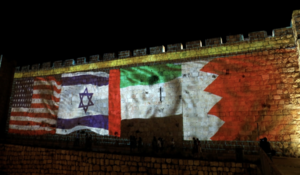The Abraham Accords and Iran’s Unconventional Warfare Activities

Author | Editor: Astorino-Courtois, A. (NSI, Inc.)
Question of Focus
[Q4] How have the Abraham Accords shaped Iranian activity abroad in terms of unconventional warfare (UW)?
Report Preview
The Abraham Accords normalizing diplomatic and economic relations between Israel and the United Arab Emirates (UAE), and Israel and Bahrain, as well as a less robust agreement with Sudan, represent a historic turning point for Israel. Together with the Camp David Accords (Egypt) and the 1994 Peace Accord (Jordan), the Abraham Accords bring to five the number of Arab states that have officially recognized Israel’s right to exist—a claim that states in the Gulf and Near East have denied since Israel was founded. For many Palestinians, on the other hand, the Accords are a devastating reminder of the historic indifference of the Arab states to their plight. To Iran, the Accords do not appear to represent anything new, yet. However, if the Accords led to close security ties between Israel and the Gulf states, Iran would face an unprecedented regional security environment that could impact its use of unconventional warfare tactics.
In this report, we take a broad view of Iran’s “unconventional warfare” (UW) tactics to include plausibly deniable activities such as 1) cyber and cyber-enabled influence campaigns; 2) support for, and employment of, various insurgent or auxiliary forces to serve as Iranian proxies; and 3) efforts to influence sympathetic (Shi’a and non- Shi’a) communities around the globe. The ultimate goal of each is the same: to apply indirect pressure on Iran’s adversaries to diminish their willingness or ability to fight Iran directly.
Download Publication
Comments